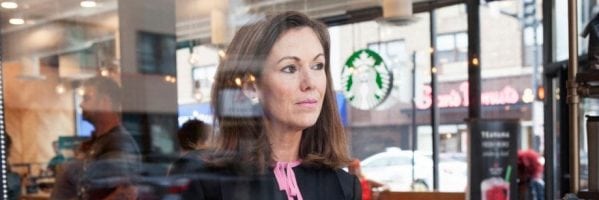Sally Blount on Solving the Female CEO Conundrum

Just one year after setting the the Fortune 500 female CEO record, numbers are already declining.
STEM Startups, Notre Dame’s New Master’s, and More – Chicago News

Let’s explore some of the most interesting stories that have emerged from Chicago business schools this week.
Why a Choice Doesn’t Feel Like a Choice When Morality Enters the Picture – Kellogg Insight
In new research co-authored by Northwestern Kellogg Assistant Professor of Management and Organizations Maryam Kouchaki finds that “across cultures, when people view a particular decision as being moral in nature, they don’t feel like they are making a choice at all, and they pay less attention to alternative courses of action.”
In other words, “people who viewed a particular issue as moral experienced a lower sense of choice when making a decision related to that issue, as compared to people who did not view the issue as moral.”
Kouchaki notes, “Even though they did the most amazing thing, it wasn’t like they felt that they deliberated. They felt like they had no choice. Their sense of freedom has been constrained and it has a spillover effect for your actual behavior.”
The study was co-authored by Cornell’s Isaac Smith and Nanyang Technological University’s Krishna Savani of Nanyang Technological University.
You can read the full article here.
Notre Dame launches New Graduate Degree in Business Analytics – Mendoza Ideas & News
Notre Dame’s Mendoza College of Business just announced its new one-year, 31-credit-hour Master’s of Science in Business Analytics (MSBA), designed for “pre-professional students with little or no work experience.”
In a recent release, John W. Berry, Sr. Professor of Business and Chair of the Information Technology, Analytics, and Operations Department, describes MSBA students:
“They were either recent graduates that didn’t have the work experience, or international students interested in the STEM degree who wouldn’t be able to work while earning their degree.”
According to the school, the program’s goal is to “provide a rigorous education in applying analytical techniques to massive data sets to solve business problems — knowledge that has become critically important due to revolutionary advances in information technology.”
Katherine Spiess, Associate Dean for Graduate Programs at Mendoza adds, “In addition to learning about cutting-edge data analytics, our MSBA students have the opportunity to explore the ethical dimensions of collecting and analyzing data to promote business as a force for good in society.”
You can find out more about the brand new Notre Dame Master’s of Science in Business Analytics here.
MakerGirl Thrives and Expands to New Heights – Gies School of Business News
MakerGirl, a nonprofit founded by Gies College of Business students to enable “college students to teach science, technology, engineering, and math (STEM) skills to girls ages 7-10,” recently expanded its operations to include robotics and special coding classes at Northwestern University and announced plans to collaborate with DePaul University.
The goal of MakerGirl’s founders is to “impact 10,000 girls by 2023, including half from underrepresented and rural communities.”

The nonprofit MakerGirl startup is built to help introduce young women with leading STEM graduates / Photo via https://www.kickstarter.com/projects/1501163298/makergirl-goes-mobile-midwest-edition
Julia Haried (’15 ACCY, ’16 MAS) and full-time employee at Deloitte, recently spoke about how invaluable the support of the school has been to the launch and growth of MakerGirl.
“In [my social entrepreneurship] class, the idea was born and incubated by myself and co-founder, Elizabeth Engele, and supported by course instructors. The idea was further launched in the iVenture Accelerator, a Gies-supported venture accelerator that gave us $10,000, mentorship, and a summer to grow MakerGirl’s impact at the Research Park. Because of these experiences, I was challenged and encouraged to solve a big social problem.”
Co-founder Elizabeth Engele also adds, “It’s so much fun and fulfilling to build a program that creates a meaningful experience for girls right now that also impacts their future. We have witnessed girls self-identify as MakerGirls after the program, which is incredibly powerful for themselves, their families, and their communities.”
She continues, “MakerGirl brings me the greatest joy when I see young girls get excited about science, technology, engineering, and math, and literally shift who they perceive themselves to be in the world.”
You can read more from the interview here and visit MakerGirl’s official site for more information.
Government Cyberattacks, the Perception of Lies, and More – Chicago News

Let’s explore some of the most interesting stories that have emerged from Chicago business schools this week.
How Governments Can Better Defend Themselves Against Cyberattacks – Kellogg Insights
Northwestern Kellogg Managerial Economics and Decision Sciences Professor Sandeep Baliga recently co-authored new research with University of Chicago’s Ethan Bueno de Mesquita and MIT’s Alexander Wolitzky, which articulates a new theory about how victims of cyber aggression might choose to retaliate—or not—against shadowy aggressors.
Baliga explains that their model presents a theory that “cyber warfare is inherently multilateral.”
“If the standard of proof is satisfied, yeah, then you should react super aggressively. But when there’s a lot of noise, you might actually want to back off because others may exploit your policy by hiding behind misidentification. If somebody wants to trigger a war between us and China, then they have every reason to do a hack that looks like China did it.”
Baliga adds, “If nations get better at both detecting attacks and identifying their perpetrators, then cyber peace is more likely to prevail.”
You can read the full article on the future of government cyberattacks here.
New Study Finds When Telling Lies, Perception Matters – Booth News
Chicago Booth Assistant Professor Emma Levine recently co-authored new research with UCLA Anderson’s Adam Eric Greenberg and Deakin University’s Matthew Lupoli that finds that “well-intentioned lies can spark strong resentment from the person who is deceived.”
In other words, “Telling a lie in order to help or protect someone—a practice known as prosocial lying—backfires if the person being lied to perceives the lie as paternalistic,” meaning lies that require the “liar to make assumptions about whether lying is in the deceived party’s best interest.”

Photo via newschicagobooth.uchicago.edu
Levine explains the trio’s findings, which were published as part of a paper entitled “Paternalistic Lies” in Organizational Behavior and Human Decision Processes:
“We sometimes tell lies to others believing that they will help, when in reality we are acting upon a paternalistic assumption that lying is better than the truth. Our research demonstrates that in these situations, the individual on the receiving end is likely to resent deception.”
You can read more about the research here.
Faculty Focused on Workplace Wellness Continue to Steer the Discussion – Gies College of Business News
Gies College of Business Assistant Professors of Finance David Molitor and Julian Reif co-authored The Illinois Workplace Wellness Study, whose results examine the efficacy of a homegrown wellness program.
According to the website, “The study’s findings will empower employers, public health professionals, and policymakers to make more informed decisions regarding the implementation of workplace wellness programs throughout the United States.”
You can find more here.
Just How Did USC Marshall’s MBA Program Attain Long-Elusive Gender Parity?

This fall, USC Marshall became the first top-tier MBA program to reach gender parity. The incoming full-time MBA Class of 2020 has as many women as men—actually a few more—52 percent. This notable achievement is a massive 20-point percentage leap from last year when women made up just 32 percent of the incoming class.
“We are proud to achieve this distinction,” Dean James G. Ellis said in a press release. “Our ongoing focus on diversity and inclusion is playing out in real numbers now. This is only the start.”
Gender Parity in Business School
While many other top schools have been working to reach gender parity over the last few years, they’ve thus far fallen short of the 50-50 mark. According to a 2017 report by the Forté Foundation and the Graduate Management Admission Council (GMAC), the average enrollment of women in full-time MBA programs at 36 business schools is 37.8 percent. That’s an improvement of less than one percent from 2016, when it was 37.1 percent, and only a few percentage points up from 2013, when it was 34 percent.
Several other leading schools have hovered in the low 40s in recent years—including Michigan Ross (43 percent), Yale School of Management (43 percent), Dartmouth Tuck (44 percent), and the University of Pennsylvania’s Wharton School (44 percent). And Northwestern’s Kellogg School of Management recently announced that its incoming Class of 2020 is 46 percent women, a record for the school. These figures all make USC Marshall’s achievement even more impressive, though it’s also a statement on women in business.
In general, women earn 60 percent of graduate degrees and fill up more than 50 percent of graduate classes, even those in male-dominated professions such as law and medicine. MBA programs, though, have lagged stubbornly behind, which many believe to be the result of a combination of factors. Some of these include the timing of business school, which is later than law or medical school because of the required prior work experience; the return on investment, and the fact that men with an MBA out-earn their female counterparts throughout their careers.
Still, there have been strides forward. Just five years ago, only three of the top 25 schools enrolled more than 40 percent women in their MBA programs. Last year, nearly half had reached that mark. Some schools have yet to release class profile information for the current incoming class, so it remains to be seen how this year compares to last. Regardless, USC Marshall reaching the 50-percent mark is a standout achievement, particularly since it hadn’t even broken 40 percent before this year.
“I’m super thankful and proud to be here at this particular point in time,” Gabriela Omenn (2020) said. “One of my key interests beyond business school is to elevate women and get them into positions of power, so it’s directly aligned with where I want to go in my career. It feels really amazing to be among such a high class of students, and I believe it’s going to be something that pays off in dividends after school is done.”
USC Marshall MBA Class of 2020, More Than Half Women
To get an idea about how USC Marshall became the first top business school to break through the gender parity barrier, we talked to Evan Bouffides, assistant dean and director of MBA admissions.
-
Recruiting Efforts Were Strong
According to Bouffides, this past year was a solid one for recruiting at USC Marshall across the board, with improved outreach to all prospective applicants, women included. But Marshall did place a concerted effort on reaching women applicants specifically, he said. These targeted outreach efforts included participation in Forté Foundation events (Marshall is a Forté member school), programming for women as part of on-campus visits, and online marketing campaigns.

Evan Bouffides, USC Marshall Assistant Dean and Director of MBA Admissions / Photo via USC Marshall
“We’ve been a bit more deliberate and certainly more comprehensive in the way we send messaging out about our program, about the admissions process, and about the university,” explained Bouffides. “ In general, I feel that we touched a lot more people via electronic communication than we have in the past.” In particular, the school increased its follow-up communication with candidates who attended various events.
Bouffides also thought January’s Women’s Week recruiting event was the best one yet. More than 100 women visited campus for this one-day event to learn about the school, meet other applicants, and get a taste of what it’s like to be a USC Marshall MBA student.
“Not only did we have a larger group than in the past, but we also, hopefully, presented a better case for ourselves than we had in the past,” said Bouffides. “Our students also did a great job contributing to the decision-making process in a tangible way.”
Current students play a big role in recruiting efforts for prospective applicants at USC Marshall. Both Marshall’s ambassador students, who work directly with admissions, and student members of its Graduate Women in Business club, reached out personally to candidates and admits as part of the admissions process to share their unique student perspectives. Many of these students also helped organize some of the recruiting events for prospective applicants.
“We also have a follow-up program, where once a person is admitted, we put them in touch with a lot of different groups, students being the preeminent group,” Bouffides explained. “The students did a great job answering questions and convincing people to join us.”
-
Improved Rankings and Reputation
Out of the many factors that may have contributed to USC Marshall reaching gender parity this year, the school’s improved rankings and reputation had a distinctly positive effect. Marshall jumped four places to 20th in the latest U.S. News ranking of leading MBA programs. And the Financial Times ranked Marshall as one of the best business schools for women to pursue an MBA (20th in the world and 12th in the United States).
“Our rise in rankings and the good press we’ve had over the last year or two has helped make us more attractive to candidates,” said Bouffides. “This, along with our other efforts, helped bring the entire class together.”
-
A Great Yield
Another factor that contributed to USC Marshall’s gender parity was this year’s impressive yield—the percentage of admitted students who ultimately enroll. It was a significant change from last year’s class, when less than a third of admitted female students (31.3 percent) chose to enroll. This year, 40.1 percent of admitted females entered the full-time MBA program. This meant that more of the students USC Marshall wanted actually attended, resulting in the highest-quality class on record.
The average GMAT score for the Class of 2020 is 705, up from 703 last year, and the average GPA is 3.5 compared to 3.48. This year’s incoming class also includes a record number of underrepresented minorities—21 percent of domestic students, compared to 16 percent previously.
“This year’s applicant pool was the strongest in our program’s history,” said Bouffides. “They brought the highest average GMAT score and the highest average GPA. The women, in particular, were extraordinarily well prepared.”
USC Marshall in the Future
So, where does USC Marshall go from here? We asked Bouffides if the school hopes to reach the same levels in coming years, but he said there is no prescribed quota for women in future classes. The goal is always just to bring in the most robust possible class, and diversity is a big part of that—gender parity being just one aspect.
“First, let me explain that we didn’t go into the admissions cycle this year stating that gender parity was our goal. We never do that for any particular metric when it comes to admissions,” said Bouffides. “We didn’t go into the season with parity as a goal, but it was an outcome of the fact that we had a large and talented group of women applying to the program. My hope is that now that we’ve hit this mark, it will be easier going forward, and hopefully, we’ll be even that much more attractive to women and men as well as they think about schools to which they may apply.”
As for Omenn, she sees USC Marshall as a model for the future where diverse backgrounds represented by different genders and groups can come together to share their ideas and perspectives—elevating discussions for a richer experience.
“Gender parity is a good model for future applicants, not just at USC but at any business school,” said Omenn. “In years to come, applicants will be able to see more of themselves in business school, which will hopefully inspire them to keep striving for their goals.”
This article has been edited and republished with permissions from our sister site, Clear Admit.
Northwestern Kellogg MBA Class of 2020: 46 Percent Women, 27 Percent U.S. Minorities

Northwestern University’s Kellogg School of Management announced today that women will make up 46 percent of the incoming two-year, full-time MBA Class of 2020. That’s a four-percentage point jump over last year and a record high for the school. U.S. minorities are also up—comprising 27 percent of this year’s first-year students, as compared to 25 percent last year. Meanwhile, average GMAT (732) and GPA (3.6) were identical to last year. Class size also remained constant at 478.
“I am very, very thrilled with the diversity of the class,” Melissa Rapp, Kellogg Director of Admissions for full-time MBA and MSMS programs, told Clear Admit. “And not just because of the percentages but also the quality of candidates across the board,” she said. International students will make up 34 percent of the incoming class, drawn from 46 countries around the globe, a modest one-percentage point decline amid soft overall international applicant volume to U.S. schools.
Rapp pledged that she and her team will keep striving to attract the most diverse classes possible. “I firmly believe that diversity in the classroom leads to better learning and a more impactful experience for every student who is here,” she said.

Steady State Elsewhere Is Great
For the past six years Kellogg’s average GMAT score has been on the rise, climbing from 708 in 2012 to 732 last year. Rapp said she is not at all concerned to have it remain static at 732 this year. “That our average GMAT and GPA have stayed the same shows that we continue to attract a really outstanding pool of applicants year after year,” she said.
Average undergraduate GPA also didn’t budge—coming in at 3.6 for now the third year running. As for what applicants studied while in college, 50 percent of this year’s incoming class majored in business or economics, up from 49 percent last year and 45 percent the year before that. STEM majors fell slightly to 29 percent, down from 30 percent the year before. Humanities majors both this year and last made up the remaining 26 percent.
Varied Professional Experience
In terms of pre-MBA work experience, approximately one in four incoming Kellogg students—24 percent—come from consulting, down from 27 percent last year. Another 19 percent come from the financial services industry, also a slight decrease from last year’s 20 percent.
Up this year? Students who have worked in tech/communications grew from 12 to 13 percent. “I think the changes that we see in our class really reflect the changes that we see in the business world,” Rapp said. “There are more people from tech, which is not surprising for anyone since there is more tech in the world than there ever has been.” Students with government/education/nonprofit experience also increased, from 7 to 9 percent.
Overall Rapp is pleased to see Kellogg continuing to attract a wide range of students from across functions and industries. “The variety continues to be very strong both in terms of our incoming students and our outgoing graduates,” she added. “Again, those differences and that diversity is what makes the Kellogg experience so strong.”
Kellogg’s Efforts to Support Women May Off
By far the biggest news today is that Kellogg has come closer than ever before to gender parity with its newest incoming class. USC Marshall School of Business made headlines last month by becoming the first leading business school to cross the 50/50 mark—women will make up 52 percent of the Marshall Class of 2020, a staggering 20-percentage-point jump over last year. At UT Austin’s McCombs School, which has also shared a preliminary Class of 2020 profile, the percentage of women slipped year over year, from 40 to 38 percent. And at Cornell’s Johnson Graduate School of Management, which welcomed it new Class of 2020 students to campus last week, women make up 33 percent, a five-point gain over last year.
“It’s really pretty exciting,” said Rapp of Kellogg’s 46 percent women. She credits the gains in female enrollment in part to the vision and leadership of outgoing Kellogg Dean Sally Blount, who served as dean from 2010 until she stepped this past spring.
Kellogg has also called on its current female students, including members of the Kellogg’s student-led Women’s Business Association (WBA), to take part in admissions outreach activities in hopes that they can forge meaningful connections with prospective female candidates early in their exploration process.

Melissa Rapp, Kellogg Director of Admissions for the full-time MBA and MSMS programs.
New this year, the school also convened its inaugural Global Women’s Summit in May. More than 1,200 women participated “live”—with 800 at Kellogg’s Global Hub in Evanston and the rest via extension events in London, Hong Kong, New York, Boston, San Francisco, Miami, Seattle, and Chicago hosted by companies including Amazon, Microsoft, and Starbucks. Over the course of the two-day event, the #KelloggWomen hashtag was trending in Chicago and generated 2.7 million overall impressions. “The breadth of engagement the summit allowed for provided a really nice bridge from prospectives to current students to our alumnae population,” Rapp said.
Kellogg also this year hosted its third-annual Women’s Leadership Seminar, a unique five-week lineup for second-year MBA students combining lectures, workshops, networking events, and alumni panels on recruiting issues women face. “The goal is to ensure that our high-potential women are equipped to pursue and navigate careers that have deep personal and professional meaning,” Rapp said.
“This combination of everything from lunch and learns to seminars to summits really helps the women here know that Kellogg understands the unique situation they are in and the challenges they will face on their journey to become impactful leaders and is proactively talking about that and helping them navigate that.”
Those Kellogg women, it seems, have been doing a good job of helping prospective female applicants see Kellogg as a place they want to be, too.
This article has been edited and republished with permissions from our sister site, Clear Admit.
Day-To-Day Creativity, and More – Chicago MBA News

Let’s explore some of the most interesting stories that have emerged from Chicago business schools this week.
Putting Creativity to Work – Chicago Booth Magazine
Chicago Booth recently published an article about how entrepreneurs and employees alike create opportunities for creative thinking.
Bay Area online video startup Darby Smart’s Nicole Farb (’09) suggests setting aside “open blocks of time for less structured thinking while brainstorming initial ideas.” She adds, “In my own life, creativity is a journey. I’m often doing it for the process, not the outcome.” She also advocates that part of embracing creativity is “failing fast.”
U.S. Postal Service Marketing and Client Relationship Manager Mauresa Pittman (’10) writes of the challenge involved in distilling the creative process to just a stamp. She writes, “The creative challenge became, how do we sum up one of the most prominent American artists of the 20th century in a pane of 12 stamps. [We also] need to consider how this message could land with different audiences and ask ourselves if we are being mindful of the diverse viewpoints.”
Ted Wright (’00), founder of Atlanta-based word-of-mouth marketing agency Fizz, believes creativity is the result of “data plus will.” He adds, “We start by asking a lot of questions about your company. For us, creativity starts with what the story is that you are trying to communicate to people.”
You can check out the full article here.
Business Students Learn the Meaning of ‘Moralogy’ During Summer Program in Japan – Mendoza Ideas & News
The Notre Dame University Mendoza Business and Culture in Japan course introduced “undergrads to Japan’s cultural and business traditions during four campus class sessions and two weeks on-site in Tokyo.”
Mendoza Associate Teaching Professor of Management & Organization and Liu Institute for Asia and Asian Studies faculty fellow Jessica McManus Warnell led the 17-member cohort on the trip to understand Japan’s “moralogical” approach to business, which “presents the idea that business can foster a virtue ethic that then makes business better for all stakeholders—customers and clients, employees, managers, and society.”
She writes, “What we were hearing from the companies we visited [in Japan] was that successful business is more about societal impact and employee engagement and customer satisfaction.”
You can read more from the article here.
What Will It Take to Get More Women on Boards? – Kellogg Insight
Northwestern Kellogg surveyed the gender gap that exists within many company boards—19.9 percent of S&P 500 company directors and 14.7 globally—and how to build more momentum to get more women to serve on boards.
The article’s first point involves the consideration of women who happen to be senior VPs or C-level positions other than CEO when companies want to add a female director. “Applying the same qualifying criteria to both male and female directors would increase the pool of executive women who bring talent, experience, and a diverse perspective to board service.”
The article notes that a major part of being considered as a board director involves “honing a value proposition,” which Kellogg’s Women’s Director Development Program has helped almost 800 women understand in order to be better prepared for board opportunities.
The article singles out a story from one high-level executive whose phone did not ring despite “vast experience, incredible skills, and a huge network.”
“When nothing happened, she realized she needed to reach out strategically to an even broader range of people to communicate the value she could bring to particular types of boards and seek their advice. She ultimately secured a seat not only on the board of one company she admired, but a number of others as well.”
Read the rest of the article here.
